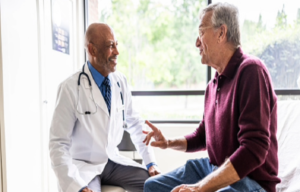The first time we missed a dialysis appointment, it wasn’t a big deal. At least, that’s what I told myself.
But when you’re 32 and trying to juggle a warehouse job, two school pickups, and a dad who needs dialysis three times a week, one small delay can turn into a crisis. For us, that first missed ride turned into two, then four, and before I knew it, my dad’s health was spiraling again.
He lives with me now. After his kidneys failed last year, I moved him out of his apartment in Manteca and into the back bedroom of our place in Modesto. It wasn’t ideal—tight quarters, old carpet, the noise of kids doing math homework outside his door—but it was safer. We thought we could make it work with family rides. But the truth is, we were all stretched too thin.
The worst was Thursdays. That’s when his appointments fell during my double shift. I’d leave the house at 4:30 a.m., come home around 7, and find him in his chair, still dressed, dialysis missed again. I felt like I was failing him.
I started calling clinics for ideas. Someone finally said, “Have you looked into dialysis transportation services?” That phrase stuck in my head. I didn’t know there were companies built for people like my dad—folks who don’t need an ambulance, but can’t take the bus either.
I found one that served the Central Valley. The website didn’t make any promises. No bold guarantees. But it did talk about trained drivers, real-time dispatch, and experience with dialysis-specific needs. That was enough to get me to call.
I explained our situation: weekday appointments, mobility issues, oxygen tank, and occasional fog delays. They listened. Took notes. Asked good questions. And then they said, “We can help.” I scheduled a ride for the following Tuesday.
That morning, my dad sat by the window for 20 minutes before the van arrived. When it did, the driver got out, walked up our cracked front walk, and introduced himself. “Hi Mr. Alvarez. I’m Darren. I’ll be taking care of you today.”
He didn’t say “transporting.” He said “taking care.” That landed hard in a good way.
Darren helped him into the van, clipped his seatbelt in gently, adjusted the seat. He even asked what kind of music Dad liked. They settled on oldies. When they pulled away, I watched from the porch with this strange mix of relief and guilt. Relief that I didn’t have to risk losing my job again. Guilt that it took me so long to make the call. The thing most people don’t understand about dialysis is that it doesn’t just take a physical toll, it reorganizes your life. Everything has to orbit around it. Your meals, your errands, your plans—none of it matters if you can’t make it to that chair on time. For months, I lived with that pressure. The worst part was seeing how it wore on my dad.
Before all this, he was the guy everyone called when their truck wouldn’t start or a fence needed fixing. He liked moving, working with his hands. But as his kidneys declined, so did his energy. On the days we made it to dialysis, he’d come home too drained to talk. On the days we missed, he felt like he’d failed. Not just his body—me, too.
There was one morning I’ll never forget. I was late picking him up. My phone had died overnight, my alarm didn’t go off, and when I pulled up, he was already outside, waiting. In the rain. That image—my father in his coat, shoulders hunched, soaked to the bone—still gets me. He didn’t say anything when he got in. Just sighed and said, “We better hope they’ll still take me.”
That was the day I knew we had to find something better.
I found the service by accident, buried in a discussion thread about elder care. A few people had mentioned it for rural pickups, saying the drivers were consistent, careful, and kind. I went to the website and found they covered the Central Valley, including Modesto. I called the number and half expected a voicemail. Instead, a calm voice answered. They asked for his address, needs, frequency. They never made me repeat anything. By the end of the call, they’d scheduled his first ride.
It wasn’t perfect at first. My dad didn’t trust strangers much. He had always driven himself or let family help. The idea of a hired ride felt clinical to him. But that changed after the first week. His driver, Mike, showed up on time every time, opened the van door before Dad could even reach for the handle, and learned how to load his walker in a way that didn’t rattle.
They talked a lot on the rides—about the drought, almond harvests, how Modesto has changed. For my dad, those rides weren’t about transportation. They were about dignity. He never liked feeling like a burden, and with this service, he didn’t have to.
Now, even on the worst dialysis days, he still smiles when he sees the van pull up.
We had one hiccup in the winter. A fog delay made me nervous, and I called the service to check. Within minutes, the dispatcher reassured me the driver had already adjusted the route to allow extra time and would arrive early. That attention to detail? You can’t put a price on it.
This past Father’s Day, my siblings and I pooled money and bought Dad a new set of gardening tools. It’s symbolic more than anything. He doesn’t move like he used to. But he’s living—not just surviving. And that’s because he can count on getting to the place that keeps him alive three times a week.
People think “non-emergency” means not important. But it’s the opposite. It means there’s still time to make a difference. And this service does, every week, without fail.
On Thursdays, the dialysis center always runs a little behind. That used to cause so much stress—Dad would worry the driver would get impatient or leave. But now, they wait. No pressure. No questions. One of the techs even told me that the drivers from this service are the most professional ones they see. That meant a lot.
The drivers don’t just drop him at the curb. They walk him in, talk to the nurses, make sure he’s settled. And when he’s done, they’re waiting right there. Not across the parking lot. Right at the entrance.
There’s a quiet relief in that kind of reliability. It means I can go to work and not check my phone every ten minutes. I can focus on my job without guilt. I can be a daughter, not a caregiver burned out by the logistics of keeping someone alive.
Dad even started tracking things again—his weight, his sodium, his fluid intake. I think having someone else involved, someone besides me, gave him more motivation. And that motivation spread. He started planning dinners again, asking about birthday plans, helping my niece with her science project. He was back.
One Friday, the driver asked if Dad wanted to swing by the farmer’s market on the way home. It was on the route. Dad hadn’t been in years. They parked close, and the driver helped him pick out a basket of strawberries. When he came home, he looked like he’d won the lottery. “You forget how good fresh air feels,” he said.
That was when I realized how many layers of freedom we’d lost before this service. We thought transportation was just about getting from A to B. But it was the bridge back to his identity.
So when people ask me if I recommend it, I say yes, without hesitation. Especially if you’re trying to manage care from a distance or balance your own life. These are the miles that matter. And I’m forever grateful we live in a region with access to services like non-emergency transportation in Modesto that understand what real care looks like.



